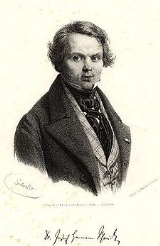
Joseph Hermann Schmidt
Encyclopedia
Joseph Hermann Schmidt was professor of Obstetrics
in Berlin, and official of the Prussian cultural ministry.
In 1834 he became head of the Paderborn general hospital and eventually also of the Paderborn
maternity clinic. He wrote a textbook of obstetrics widely used in Prussia
. In 1842, together with Pauline von Mallinckrodt
, he founded a private institution for the blind in Paderborn. In 1844 he became an official in the Prussian Ministry of Culture, the head of the of gynecological section of the Berlin Charité Clinic and professor of obstetrics at the Humboldt University of Berlin. He died in 1852 of a lung bleeding.
A biography on Schmidt was published in 1939.
who identified contamination as the principal source of high mortality rates from puerperal fever
. In an editorial in 1850 he wrote:
While he disagreed with Semmelweis that contaminated hands was the only cause of puerperal fever he thought that Semmelweis' observations regarding the positive effects of chlorine washings were "totally sufficient to warrant caution", and stated that "this inexpensive requirement will be adopted into practice at every obstetrical clinic."
Semmelweis also scorned Schmidt of underreporting deaths from childbed fever: From 1844-1852 there were only 13 deaths out of 2,631 patients at the Charité. In the same period however, 442 patients "were transferred to other stations". Semmelweis was quick to point out that patients are transferred as soon as their health becomes doubtful.
Obstetrics
Obstetrics is the medical specialty dealing with the care of all women's reproductive tracts and their children during pregnancy , childbirth and the postnatal period...
in Berlin, and official of the Prussian cultural ministry.
In 1834 he became head of the Paderborn general hospital and eventually also of the Paderborn
Paderborn
Paderborn is a city in North Rhine-Westphalia, Germany, capital of the Paderborn district. The name of the city derives from the river Pader, which originates in more than 200 springs near Paderborn Cathedral, where St. Liborius is buried.-History:...
maternity clinic. He wrote a textbook of obstetrics widely used in Prussia
Prussia
Prussia was a German kingdom and historic state originating out of the Duchy of Prussia and the Margraviate of Brandenburg. For centuries, the House of Hohenzollern ruled Prussia, successfully expanding its size by way of an unusually well-organized and effective army. Prussia shaped the history...
. In 1842, together with Pauline von Mallinckrodt
Pauline Mallinckrodt
Pauline von Mallinckrodt was the German foundress of the Sisters of Christian Charity. She was the sister of Hermann von Mallinckrodt and daughter of Detmar von Mallinckrodt, both local politicians.-References:...
, he founded a private institution for the blind in Paderborn. In 1844 he became an official in the Prussian Ministry of Culture, the head of the of gynecological section of the Berlin Charité Clinic and professor of obstetrics at the Humboldt University of Berlin. He died in 1852 of a lung bleeding.
A biography on Schmidt was published in 1939.
Controversy with Ignaz Semmelweis
Schmidt approved of obstetrical students having ready access to morgues in which they could spend time while waiting for the labor process. For this he had a controversy with Ignaz SemmelweisIgnaz Semmelweis
Ignaz Philipp Semmelweis was a Hungarian physician now known as an early pioneer of antiseptic procedures. Described as the "savior of mothers", Semmelweis discovered that the incidence of puerperal fever could be drastically cut by the use of hand disinfection in obstetrical clinics...
who identified contamination as the principal source of high mortality rates from puerperal fever
Puerperal fever
Puerperal fever or childbed fever, is a bacterial infection contracted by women during childbirth or miscarriage. It can develop into puerperal sepsis, which is a serious form of septicaemia. If untreated, it is often fatal....
. In an editorial in 1850 he wrote:
"A normal birth is often a slow process and it would be unreasonable to expect every young man .. to remain in the delivery room... In this respect it is very convenient that maternity wards are under the same roof as other clinics. [Students] are thus able to go into surgical or medical wards ... or they can go into the morgue from where they can be quickly called if significant change occurs."
While he disagreed with Semmelweis that contaminated hands was the only cause of puerperal fever he thought that Semmelweis' observations regarding the positive effects of chlorine washings were "totally sufficient to warrant caution", and stated that "this inexpensive requirement will be adopted into practice at every obstetrical clinic."
Semmelweis also scorned Schmidt of underreporting deaths from childbed fever: From 1844-1852 there were only 13 deaths out of 2,631 patients at the Charité. In the same period however, 442 patients "were transferred to other stations". Semmelweis was quick to point out that patients are transferred as soon as their health becomes doubtful.
Works
- Joseph Hermann Schmidt (1825) De corporum heterogeneorum in plantis animalibusque Genesi
- Joseph Hermann Schmidt (1839) Lehrbuch der Geburtskunde für die Hebammen in den kgl. preußischen Staaten

